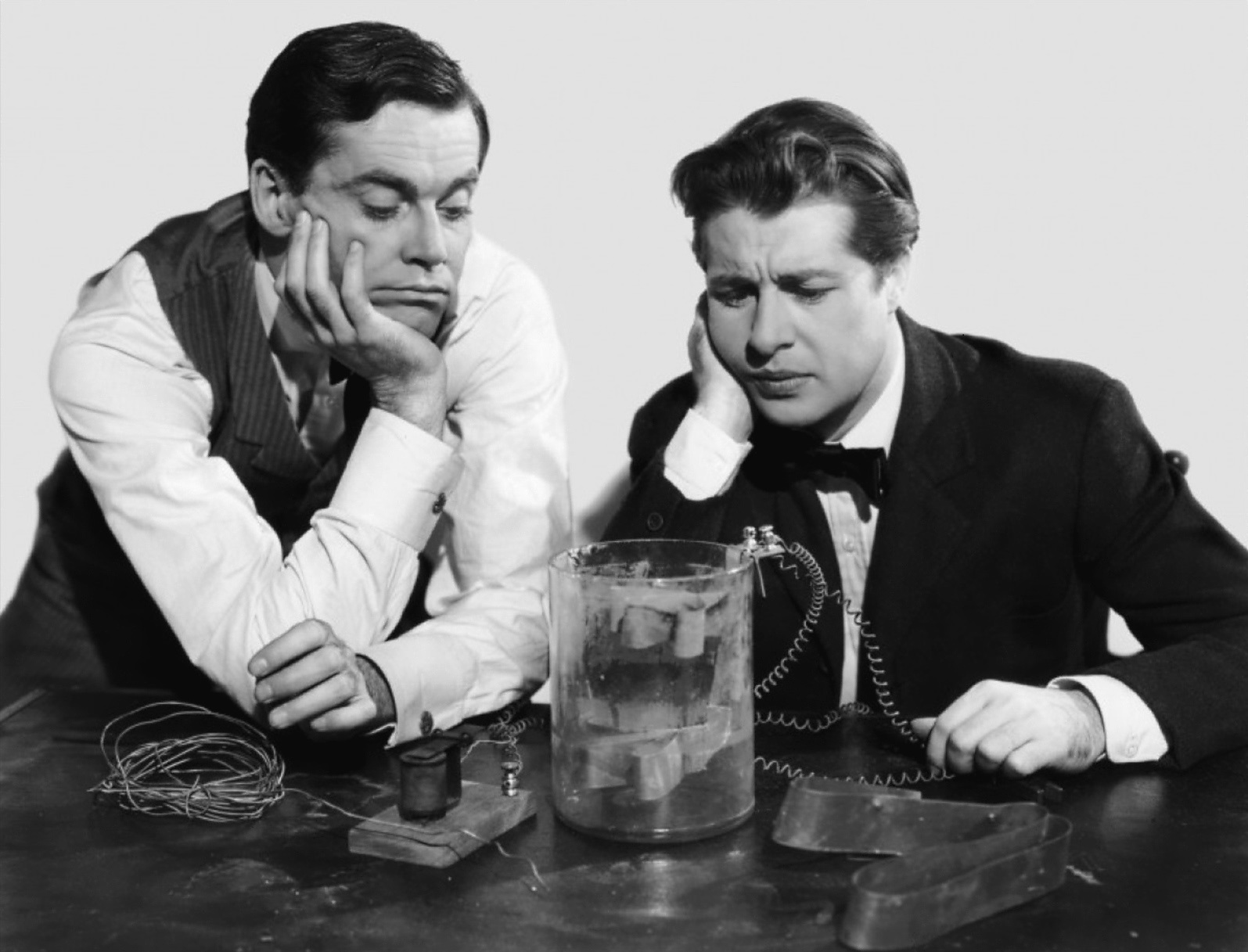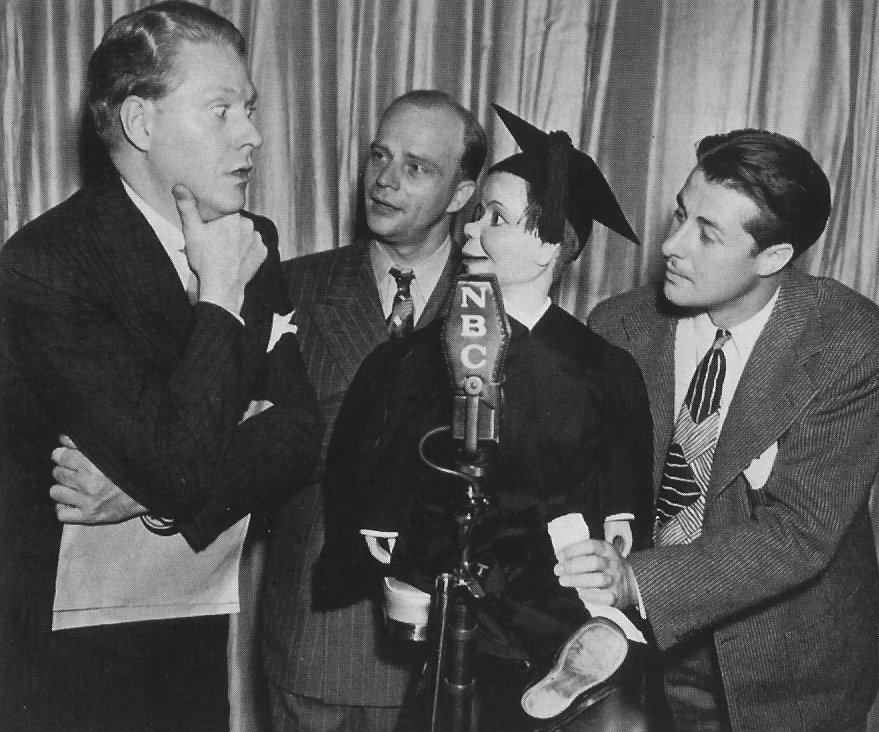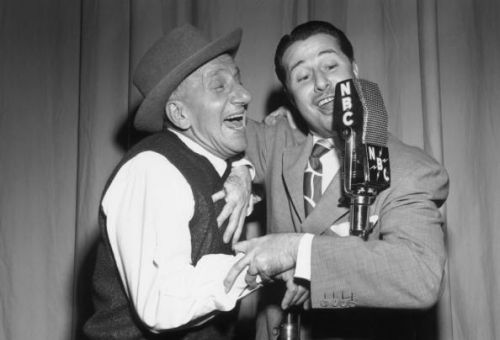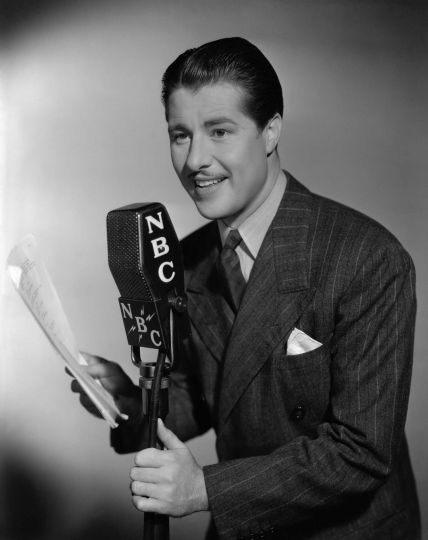Happy Birthday, Don Ameche!
Posted by Ivan G. Shreve, Jr. on May 31st 2015
Dominic Felix Amici was born on this date in Kenosha, WI in 1908. When Dominic changed his name to Don Ameche, however, that’s when any number of doors started opening for one of show business’ formidable talents. Ameche could sing, act, tell jokes and perform the necessary duties of a “master of ceremonies” with effortless ease. Beginning with uncredited bits in 1935’s Clive of India and Dante’s Inferno, Don would flourish for over half a century with a movie career that reached its pinnacle in long overdue recognition from his peers—a Best Supporting Actor Oscar for his winning performance as a breakdancing senior citizen in Cocoon (1985).
Don’s original ambition was to study law during his years attending Marquette University, Loras College, and the University of Wisconsin. But he was bitten by the acting bug, and he took advantage of the lead actor’s AWOL in a stock company production of Excess Baggage by offering his services at the last minute. The experience thrilled him so much that he landed the juvenile role in a New York staging of Jerry for Short, which ultimately lead to a vaudeville tour with the legendary Texas “Hello, suckers!” Guinan. Guinan didn’t keep Don around long, however; she purportedly dismissed him because she felt he was “too stiff.”
But Don Ameche wasn’t “too stiff” for the up-and-coming medium of radio. His earliest work was on The National Farm and Home Hour, and the actor soon demonstrated an incredible flexibility in front of the mike. He was one of the early “Mr. First Nighters” on The First Nighter Program, played “Bob” on the popular Betty and Bob daytime drama, and even worked alongside the famous film German shepherd known as Rin-Tin-Tin in a juvenile radio serial. All of those shows were based out of Chicago – and Don was featured on other Windy City programs as well, including Empire Builders, Grand Hotel, and Jack Armstrong. The Armstrong series allowed him to play opposite his brother Jim (who was the titular boy hero, while Don played Captain Hughes).

Ameche left Chicago in the mid-30s to try his luck in Hollywood. He was one of 20th Century-Fox’s most dependable leading men, gracing such features as One in a Million (1936), In Old Chicago (1938), You Can’t Have Everything (1937), Alexander’s Ragtime Band (1938), The Three Musketeers (1939) and Midnight (1939). The Story of Alexander Graham Bell (1939) would bring Don his greatest fame; playing the inventor of the telephone sparked a lot of “Don-Ameche-invented-the-telephone” jokes in pop culture, and “Ameche” became slang for the device itself. The actor’s string of movie hits continued in the 1940s with entries like Down Argentine Way (1940), That Night in Rio (1941), Moon Over Miami (1941) and Wing and a Prayer (1944). His 1943 film Heaven Can Wait, directed by Ernst Lubitsch and co-starring Gene Tierney, is a particular favorite among classic film fans: Don plays a recently deceased rake who descends to Hell, convinced that his lifelong romantic escapades have necessitated he spend eternity there. The Devil (Laird Cregar) convinces him otherwise by looking back at his life.
Don Ameche’s success in films during the 1930s provided the springboard for his landing one of his best-remembered radio gigs: he was a member of the all-star lineup of The Chase and Sanborn Hour, which made its debut over the airwaves on May 9, 1937. A talented ventriloquist named Edgar Bergen would eventually steal the spotlight (along with his dummies Charlie McCarthy and Mortimer Snerd), yet it’s important to remember that Ameche’s talents were given ample room to flourish on a variety series that also featured Nelson Eddy and Dorothy Lamour. Don was called upon to sing a song every week, as well as perform in dramatic skits (many of which were written by newcomer Arch Oboler). During W.C. Fields’ brief stint with Chase and Sanborn, Don also acted as The Great Man’s straight man (though considering the unpredictability of Fields, “handler” might be the more apt job description).

Eddy and Lamour left The Chase and Sanborn Hour in 1939, but Don continued his association with Bergen & McCarthy until the mid-40s. Don was the show’s jack-of-all-trades—announcer, vocalist…and occasional foil for Bergen’s wisecracking dummy (in the form of Gazolo, an Italian who ran afoul of Charlie from time to time). In addition to his Bergen & McCarthy duties, Don branched out to host a short-lived Blue Network series in 1943 entitled What’s New? Later in the decade, he was the host of Your Lucky Strike, a spin-off off the popular Your Hit Parade, from 1948 to 1949.
In the summer of 1946, Don Ameche did two audition records for a possible series to be sponsored by Drene Shampoo: The Don Ameche Show and The Drene Show. Drene Time was the eventual result of these two projects; it premiered in December of 1946, and the actor-singer found himself paired with talented female vocalist Frances Langford (who also acted and did comedy). This modest little series would introduce the characters for which folks remember Don and Frances best: John and Blanche Bickerson, the squabbling couple created by scribe Philip Rapp. (Drene Time also featured contributions from a young comic named Danny Thomas, who played Blanche’s brother Amos.) When Drene Time was cancelled, Don and Frances took the Bickersons to Old Gold Time—a comedy-variety half-hour they shared with actor-comedian Frank Morgan. Old Gold Time was cancelled after one year, but The Bickersons proved so popular that they later resurfaced on Bergen & McCarthy, with actress Marsha Hunt playing Blanche to Ameche’s John.

Don took over for Alan Young as the co-star of The Jimmy Durante Show in April of 1949…and worked with The Schnoz until Durante’s radio show called it quits at the end of the 1949-50 season. Ameche’s efforts with Jimmy and Edgar Bergen—as well as his work with Francis Langford on The Bickersons—removed all doubt that he was admiringly adept at radio comedy, which he also demonstrated as a guest star on shows headlined by such funsters as Jack Benny, Bing Crosby, Harold Lloyd and Spike Jones. During the war, Don also gave his all on such AFRS shows as Command Performance and Mail Call and displayed his dramatic side on anthology programs such as The Cavalcade of America, Family Theatre, The Lux Radio Theatre, The Screen Guild Theatre and Theatre of Romance.
Don Ameche would make the transition to the small screen like so many of his fellow radio artists; he was the host of Don Ameche’s Musical Playhouse from 1950 to 1951 and re-teamed with Frances Langford for more Bickersons fun on The Frances Langford-Don Ameche Show from 1951-52. His television and movie chores were sporadic due to his renewed interest in performing on Broadway, but he made the guest star rounds on such series as Burke’s Law and Julia, and gave interesting performances in the likes of A Fever in the Blood (1961) and Suppose They Gave a War and Nobody Came? (1970). His teaming with Ralph Bellamy in 1983’s Trading Places paved the way for his movie career resurgence (and Oscar win for Cocoon), and he would appear in films like Harry and the Hendersons (1987) and Things Change (1988) before his passing in 1993.

To pay tribute to the man who would have turned 107 today, Radio Spirits has on hand two Edgar Bergen & Charlie McCarthy collections that feature Don Ameche: Homefront Charlie and W.C. Fields and Friends. You’ll also hear Don battle it out with his radio spouse Frances Langford as The Bickersons in Put Out the Lights! And on our Jack Benny compendium No Place Like Home—well, Don pops up in a surprise cameo on a November 21, 1948 broadcast that resulted in the reduction of radio’s famous cheapskate to uncontrollable laughter…and we think it will do the same to you, too.

